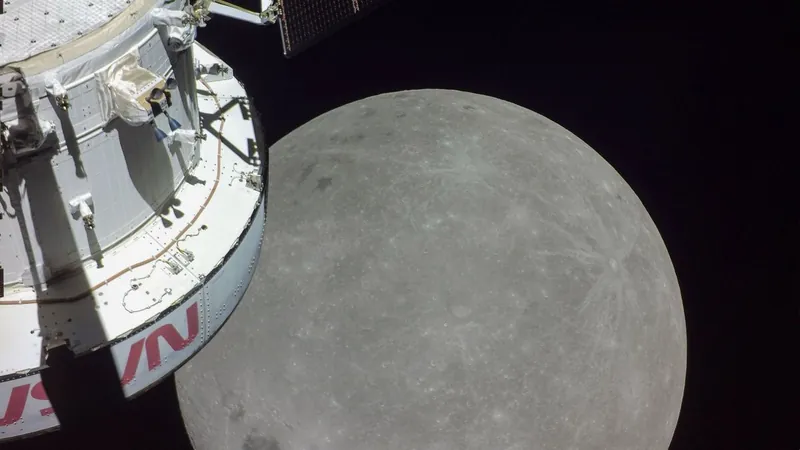
NASA's Artemis Missions Delayed Again: Is This a Setback for Moon and Mars Exploration?
2024-12-23
Author: Wei Ling
NASA's Artemis Missions Delayed Again: Is This a Setback for Moon and Mars Exploration?
NASA has once again postponed its planned crewed Artemis lunar missions, now rescheduled for 2026 and 2027. This decision not only impacts the agency’s timeline but also raises significant questions regarding its leadership role in space, especially against the backdrop of increasing competition from China.
Originally set for launch in September 2025, Artemis 2, which will carry a crew of three American astronauts alongside a Canadian astronaut on a lunar flyby, has been shifted to April 2026. Meanwhile, the historic Artemis 3 mission, aimed at landing humans on the Moon for the first time in over fifty years, has been delayed from late 2026 to mid-2027.
The delays primarily stem from an issue identified during the uncrewed Artemis 1 mission involving the Orion spacecraft's heat shield. NASA Deputy Administrator Pam Melroy explained that during a planned "skip reentry," the spacecraft accumulated heat that caused pressure buildup and subsequent cracking in the heat shield, prompting the agency to extend its timeline to ensure astronaut safety.
Despite the setbacks, the additional time will allow NASA to thoroughly address the heat shield issue, enhance the lunar landing systems, and prepare essential equipment such as space suits for extravehicular activities. However, this postponement could disrupt the workflow of contractors and lead to inefficiencies, a concern not to be taken lightly in the dynamic field of aerospace engineering.
These delays occur at a politically tumultuous time within the United States, especially following the recent election of Donald Trump, who is known for his focus on slashing costs and budgets. His administration might challenge the feasibility of NASA's projects, particularly the Space Launch System (SLS)—the heavyweight rocket designed for these lunar missions. The SLS has been criticized for its high costs and continuing development delays, with the U.S. Government Accountability Office labeling it "unaffordable" for sustained missions.
In a surprising twist, Trump has reportedly put forward billionaire Jared Isaacman to lead NASA. Isaacman has extensive experience in private space travel, including two successful missions with SpaceX. Given Trump’s connection with Elon Musk, another prominent figure in private space exploration, there’s speculation about a potential pivot from SLS to SpaceX’s Starship for future missions. Starship's reusability could provide economic advantages, although such a dramatic shift would involve complex political negotiations.
On the international front, these delays could tighten the competitive landscape in space exploration. China has ambitious plans to land its first astronauts on the Moon by 2030, and any further postponements by NASA might enable Beijing to secure a symbolic victory by achieving a lunar landing ahead of the U.S. This advantage could dramatically affect perceptions of space leadership, emphasizing the need for a swift response from NASA.
Additionally, there's speculation that with the new administration, NASA might abandon the lunar focus entirely, potentially redirecting efforts towards Mars. Elon Musk’s vision for colonizing Mars has garnered global attention, and the shift might align more closely with private sector interests, complicating future collaboration on lunar missions.
The current delays also pose risks to NASA’s partnerships with international stakeholders like the European Space Agency and Japan, all of whom are invested in the Artemis program. The resonance of Artemis extends beyond the Moon as a stepping stone to Mars and beyond, representing a critical element of U.S. space ambition.
As NASA aims to establish a consistent and efficient flight schedule, it faces the potential of significant organizational changes and political maneuvering that could redefine its plans for Artemis and the future of human exploration in outer space. Will these delays hinder or enhance NASA’s aspirations? As the space race continues, all eyes will be on how the agency navigates this uncertain territory.



 Brasil (PT)
Brasil (PT)
 Canada (EN)
Canada (EN)
 Chile (ES)
Chile (ES)
 España (ES)
España (ES)
 France (FR)
France (FR)
 Hong Kong (EN)
Hong Kong (EN)
 Italia (IT)
Italia (IT)
 日本 (JA)
日本 (JA)
 Magyarország (HU)
Magyarország (HU)
 Norge (NO)
Norge (NO)
 Polska (PL)
Polska (PL)
 Schweiz (DE)
Schweiz (DE)
 Singapore (EN)
Singapore (EN)
 Sverige (SV)
Sverige (SV)
 Suomi (FI)
Suomi (FI)
 Türkiye (TR)
Türkiye (TR)